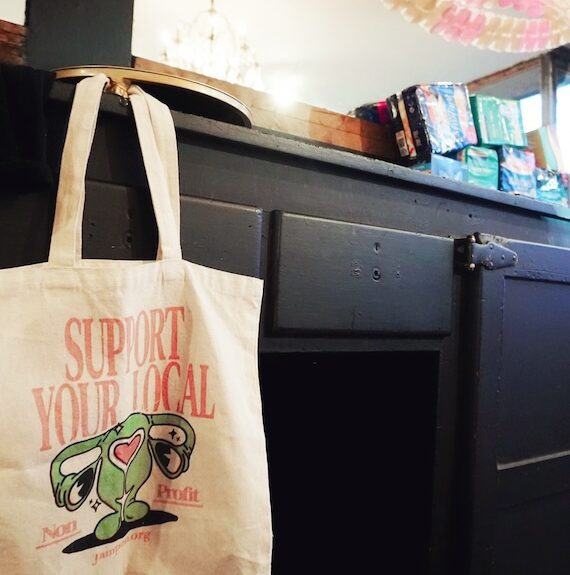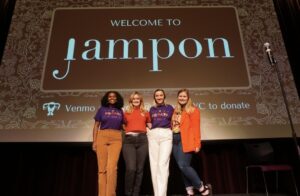Economics Featured Articles Gender Health
Free female products reduce ‘period poverty’
By Ashanty Rosario
In New York City, the demand for menstrual products in shelters, schools, and street outreach vans keep rising but the supply doesn’t keep up.
With about 350,000 individuals – a third of them being women and girls – unhoused and inflation pushing basic goods out of reach, advocates for these women urge that pads and tampons are a pressing yet overlooked need. Nonprofits like I Support the Girls and Jampon try to bridge the gap.
But stigma, funding shortages and silence make that difficult.
“We all kind of made do with what we had,” Sarah Kehoe,44, the New York City affiliate director for I Support the Girls, said.
Kehoe knew about what she and others call period poverty long before her advocacy centered around menstrual product access.
When her family couldn’t afford to buy female sanitary products at the pharmacy, she bound up scratchy, single-ply toilet paper from her public school’s bathroom dispenser and stuffed it in the crotch of her underwear.
During the COVID-19 pandemic, Kehoe started volunteering at donation pop-ups from Harlem to Brooklyn.
Seeing past the heaps of clothing, footwear and bag donations, she noticed a recurring shortage of menstrual products and children’s diapers.
“Those are two areas that really, like, struck a chord with me,” she said.
In 2023, she scouted nonprofits that were filling the shortages. I Support the Girls pinged as one of the most-searched results. An international network founded in 2015, it was responsible for over 21 million bra, underwear and menstrual kit donations. It felt like a perfect fit.
Only, there were no chapters in New York City.
“It seemed very natural to be like, ‘Well, I’ll do it.’ Like, I was already doing that,” Kehoe said. “And if I could have more support from a bigger organization, fantastic!”
As the organization’s director for the city’s five boroughs, Kehoe helps coordinate corporate and community drives, delivering products directly to pantries, shelters and schools.
Some days, companies drop off donations at Kehoe’s doorstep. On others, she combs through online listings, cold-emailing contacts or grassroot groups for partnerships.
Impromptu exchanges sometimes happen while she’s working. At a First Grace Baptist Church pantry drop-off, Lydia, a fellow staffer, noticed Sarah Kehoe holding a box overflowing with bralettes and panties.
“‘Can I have some? I haven’t had a new bra in, like, a decade,’” said Kehoe, recalling how that employed but low-wage staff hesitatingly approached. She handed one over on the spot. “‘Absolutely. Would you like a sizing?’” she asked.
Between events, Kehoe hefted a wagon loaded with hygiene kits onto bustling train carts.
More often than not, traveling women spotted needed products and seized the opportunity to ask if they’re free for the taking.
Period poverty isn’t limited to people without a home of their own. It affects working and lower-class families living on shoestring budgets.
“Somebody might be housed, but making decisions about buying food rather than pads.” Kehoe continued. “That’s not where you’re going to spend your money if you have like $50 left over from the week after rent and groceries.”
But the barrier also stretches beyond finances. Even when donations are available, Kehoe admitted that many don’t ask for menstrual products.
They’re either too ashamed to admit to that kind of need or don’t know there’s help.
Beginning in 2018 as a grassroots campaign with the local Y.W.C.A. near the University of Evansville, Jampon carried into the culturally rich landscape of New York City in 2023 as an independent nonprofit.
Determined to break through that kind of stigma and make people more aware, Jampon hosts an annual Halloween fundraiser, featuring local artists, slam poets, dancers, musicians and other performers.
The proceeds go to New Alternatives, a nonprofit for homeless LGBTQ+ youth.
“We structure events around it being a celebration, around being joyful,” said Synit Zecarias, 26, co-executive director of Jampon. “One of the reasons we do that is really to address that stigma.”
At the 2024 fundraiser, hosted in Williamsburg, Brooklyn, crocheted tampons hung. Handmade uterus cards covered the tables. Beige tote bags sporting graphic illustrations of pink ovaries were filled with merchandise being gifted to attendees.
Local, indie singer Angelique Rodriguez, 25, was among those who took to the stage for the second year in a row since Jampon’s settlement in New York City.
“These are our bodies,” Zecarias said. “These are what people with uteruses go through.”




